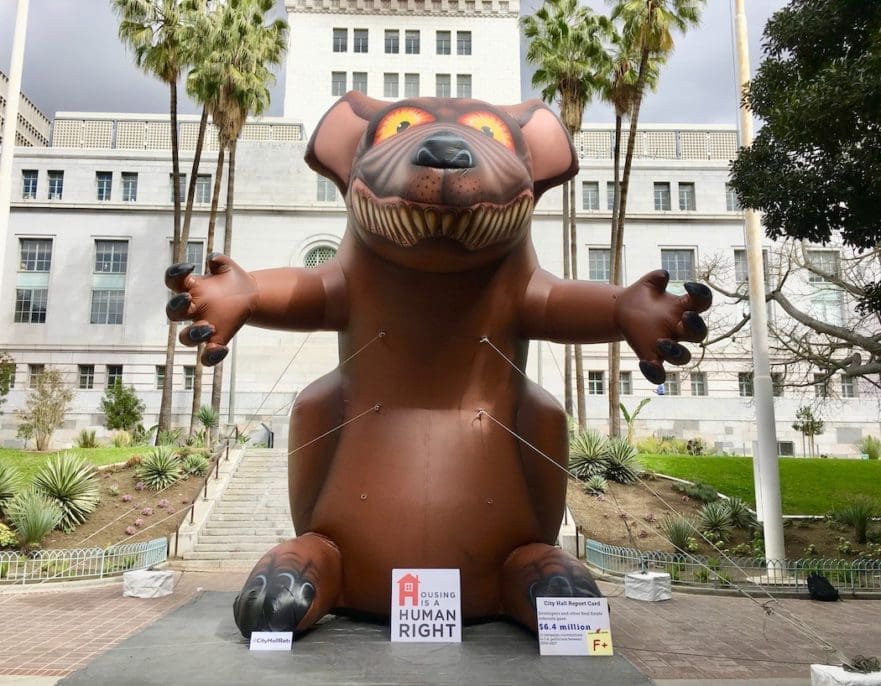At Los Angeles City Hall on Friday, Housing Is A Human Right denounced pay-to-play, spot zoning, and other troubling land-use practices by L.A. politicians that are fueling a citywide gentrification crisis. Activists have long told Mayor Eric Garcetti and the L.A. City Council that their back room deals, which produce billions for luxury-housing developers, are devastating middle- and working-class neighborhoods.
“It creates the conditions for our communities,” said Housing Is A Human Right Director Rene Moya at the protest, “including our communities of color, to be pushed out… It creates development that displaces people.”
Housing Is A Human Right, which installed a giant, inflatable rat outside City Hall, was joined by the Coalition to Preserve L.A. and L.A. Tenants Union.
Perhaps ironically, City Hall is dealing with a serious rat infestation problem. Along with a federal corruption probe examining possible illegal activities between L.A. politicians and developers, Housing Is A Human Right noted on Friday that “there’s a lot of dirty business happening” inside the rooms of city government.
In November, the home and offices of L.A. Councilman and Planning and Land Use Management (PLUM) Committee Chairman Jose Huizar were raided by the FBI as part of a corruption probe, looking into money contributions from developers. Since then, other City Hall officials, including a former aide of Mayor Eric Garcetti, have become entangled in the federal investigation. Huizar has since lost his PLUM chairmanship.
For years, L.A. politicians have ignored local land-use regulations and delivered “spot-zoning” approvals — zone changes and general plan amendments — to high-end developers so they can build luxury-housing mega-projects in middle- and working-class neighborhoods in Koreatown, South L.A., Downtown L.A., and other communities. Without those City Hall approvals, the upscale development couldn’t happen.
In return, developers and other real estate insiders have donated millions in campaign cash and other political monies to L.A. politicians, according to the city’s Ethics Commission. It’s a controversial practice known as “pay-to-play.”
Developers then construct luxury housing for the affluent who move into a middle- or working-class neighborhood, but it creates a destructive ripple effect: rents in nearby, once-affordable apartment buildings suddenly skyrocket. Longtime residents are left struggling to make ends meet as the neighborhood gentrifies. They’re forced to move out — and middle- and working-class residents can no longer move in.
Not coincidentally, residents in Los Angeles and other cities in California are getting slammed by a worsening housing affordability crisis.
“We do not need more luxury apartments,” said L.A. Tenants Union member Zerita Jones, a resident of South L.A., at Friday’s City Hall protest. “We need housing for low-income people, for the people who live in the community.”
The Los Angeles Index of Displacement Pressure and the Los Angeles Index of Neighborhood Change — city databases that predict displacement and measure gentrification — show that the years-long luxury-housing push by Mayor Eric Garcetti and the L.A. City Council has generated a citywide gentrification crisis.
Two L.A. ZIP codes, in fact, sit on RENTCafe’s Top 20 list of most gentrified neighborhoods in the nation.
A key reason is the pay-to-play, spot-zoning practices by L.A. politicians, who are carrying out government-sanctioned gentrification.
“The policies that cause cities to gentrify are crafted in the offices of real estate moguls and in the halls of city government,” writes author Peter Moskowitz in the well-regarded book How to Kill A City. “The coffee shop is the tip of the iceberg.”
On Friday, Housing Is A Human Right demanded that L.A. politicians should not approve any more luxury-housing mega-projects in the City Hall pipeline as the federal corruption probe continues. Housing Is A Human Right also urges local and state politicians to create housing policies that protect tenants, preserve existing affordable housing, and produce truly affordable housing.

